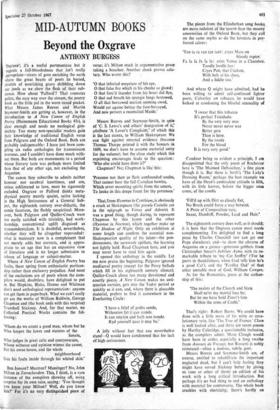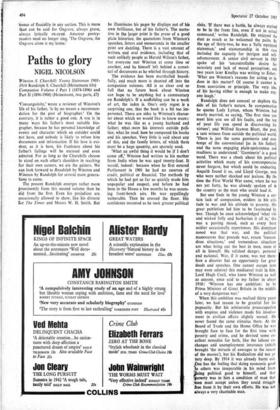Beyond the Oxgrave MID-AUTUMN BOOKS
ANTHONY BURGESS
'Oxgrave'; it's a useful portmanteau but it suggests a full-bloodedness that isn't really appropriate—rivers of gore enriching the earth where the great beasts of poets lie buried, rivulets of nourishing gravy dribbling down our jowls as we chew the flesh of their sub- stance. How about Pafford'? That connotes pallor, the easy way over the stream, the poetry book as the little pal in the worn tweed pocket. What Messrs James Reeves and Martin Seymour-Smith are getting at, however, in the introduction to A New Canon of English Poetry (Heinemann Educational Books 45s), is clear enough and needs no neological gim- mickry. Too many non-specialist readers gain their knowledge of traditional English verse from Palgrave and the Oxford Book. Both are probably indispensable: I have just been com- piling six radio anthologies for transmission overseas, and I couldn't have done much with- out them. But both are monuments to a period whose literary taste was perhaps more limited than that of any other age, not excluding the Augustan.
The canon they subscribe to admits neither humour nor cerebral knottiness, and sex, unless sublimated to love, must be rigorously excluded. Oxgrave or Palford thinks meta- physical poetry merely quaint, satire lacking in the High Seriousness of a General Sub- ject, the eighteenth century over-didactic, the comic facetious, the fleshly unspiritual. More- over, both Palgrave and Quiller-Couch were too easily satisfied with triviality, bad work- manship, conventional uplift disguised as transcendentalism. It is doubtful, nevertheless, whether they will be altogether superseded: what is necessary now is a complement that not merely adds but corrects, and is appro- priate to an age that has an expansive view of literature and is no longer submissive to taboos of language or subject-matter.
Where A New Canon of English Poetry has faults, these spring from enthusiastic partisan- ship rather than exclusory prejudice. And most of the exclusions are of poets whom the com- pilers would, doubtless, have delighted to put in. But Hopkins, Blake, Donne and Whitman don't need anthological representation: anyone can get them in paperback. What we can't easily get are the works of William Baldwin, George Chapman and (the book ends with this surprise) Trumbull Stickney. And, for that matter, no Collected Poetical Works contains the fol- lowing:
'Whom do we count a good man, whom but he Who keepes the lawes and statutes of the Senate, Who judges in great suits and controversies, Whose witnesse and opinion winnes the cause; But his owne house, and the whole neighbourhood Sees his foule inside through his whited skin.'
Ben Jonson? Marston? Massinger? No, John Milton in Tetrachordon. This, I think, is a rare instance of the compilers showing off, using surprise for its own sake, saying: 'You thought you knew your Milton? Well, do you know this?' For it's no very distinguished piece of
verse; it's Milton stuck in argumentative prose taking a breather. Another shock proves salu- tary. Who wrote this?
'0 that infected moysture of his eye,
0 that false fire which in his cheeke so glowd: 0 that forc'd thunder from his heart did flye, 0 that sad breath his spungie lungs bestowed, 0 all that borrowed motion seeming owed, Would yet againe betray the fore-betrayed, And new pervert a reconciled Maide.'
Messrs Reeves and Seymour-Smith, in spite of 'C. S. Lewis's and others' denigration of it,' attribute 'A Lover's Complaint,' of which this is the last stanza, to William Shakespeare. We can fight against external evidence (because Thomas Thorpe printed it with the Sonnets in 1609, we don't have to assume auctorial unity for the volume); but the close study which this reprinting encourages leads to the question: 'Who else could have done it?'
Chapman? No; Chapman is like this: 'Presume not then ye flesh confounded souks, That cannot bear the full Costalion bowies, Which sever mounting spirits from the sences, To looke in this deepe fount for thy pretenses.'
That, from Hymnus in Cynthiam,is obviously a crack at Shakespeare (the pocula Castalia are in the epigraph to Venus and Adonis). It was a good thing, though daring, to represent Chapman by this hymn and the other (Hymnus in Noctem), which together make up The Shadow of Night. Only an exhibition at some length can confirm the essential non- Shakespearian quality of his talent—the pon- derousness, the savework epithets, the learning not lightly held. Read Chapman here, and you may never have to read him again.
I opened this anthology in the middle. Let me now praise the beginning. Palgrave ignored mediaeval poetry (except for the Percy ballads which fill in his eighteenth century silence); Quiller-Couch chose too many devotional and courtly pieces. A New Canon makes no anti- quarian curtsies, gets into the Tudor period as quickly as it can, and, where there is glossable material, prefers to find it somewhere in the Everlasting Circle:
'I have a Jelyf of godes sonde, Withouten fyt it can stonde.
It can smytyn and hath non honde. Ryd yourself quat it may be.'
A jelly without feet that can nevertheless stand—Q would have condemned that for lack of high seriousness. The pieces from the Elizabethan song books are more redolent of the tavern than the moony amorosities of the Oxford Book, but they call on the same myths as do the lutenists in per- fumed salons: `Tan ta ra ran tan tant : cryes Mars on bloudy rapier.
Fa la la fa la la: cries Venus in a Chamber.
Toodle loodle loo: Cryes Pan, that Cuckoo, With bels at his shoo, And a fiddle too.'
And where Q might have admitted, had he been willing to admit self-confessed lighter poets, Calverley on tobacco, he would have balked at condoning the blissful sensuality of 'I swear that this tobacco It's perfect Trinidado.
By the very very" mas Never never never was Better gere Than is here.
By the roode For the bloud It is very very good.'
Candour being so evident a principle, I am disappointed that the only poem of Rochester here is 'The Maimed Debauchee,' a fine piece though it is. But there is Swift's The Lady's Dressing Room,' perhaps the best example we have of the Dean's ambivalent attitude to filth, with its little horror, before the bigger ones come, of the combs 'Fill'd up with Dirt so closely fixt, No Brush could force a way betwixt.
A Paste of Composition rare, • Sweat, Dandriff, Powder, Lead and Hair.'
The eighteenth century does well, as it should; it is here that the Oxgrove canon most needs complementing. I'm delighted to find a long piece by Charles Churchill (we can get our Pope elsewhere), and—to show the obverse of Augustus on a guinea—generous gobbets from Christopher Smart's Jubilate Agno, with its re- markable tribute to 'my Cat Jeoffry' (Tor he purrs in thankfulness, when God tells him he's a good Cat'), and the 'Yardley Oak' of that other unstable man of God, William Cowper.
As for the Romantics, guess at the author- ship of this: 'The zealots of the Church and State Shall ne'er my mortal foes be; But let me have bold Zimri's fate Within the arms of Cozbi.'
That's right: Robert Burns. We could have done with a little more of his witty or revo- lutionary vein, like 'The Tree of France.' Clare is well looked after, and there are seven poems by Hartley Coleridge, a questionable inclusion, as the compilers admit. More Clough would have been in order, especially a long swathe from Amours de Voyage, but Rossetti is nobly reinstated—often a nodous, subtle poet.
Messrs Reeves and Seymour-Smith are, of course, entitled to rehabilitate the important neglected dead, but I can't help feeling they might have served Stickney better by giving us (one or other of them) an edition of his work with a long critical introduction. But perhaps it's no bad thing to end an anthology with material for controversy. The whole book crackles with electricity; there's hardly an 'ounce of flaccidity in any section. This is more than can be said for Oxgrave, always grave, always lyrically ox-eyed. Amateur poetry- readers need no longer sing, The Oxgrave, the Oxgrave alone is my home.'











































 Previous page
Previous page